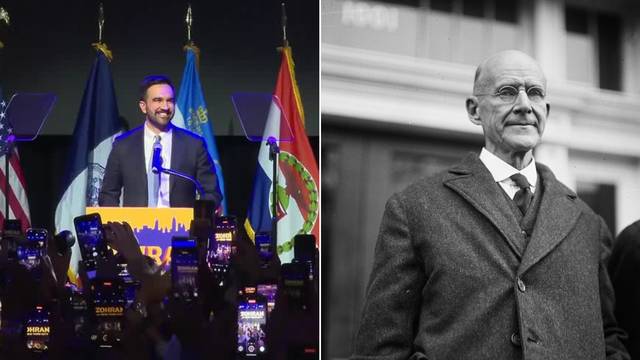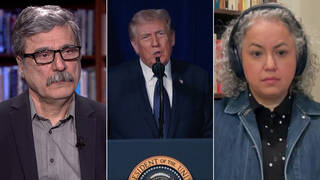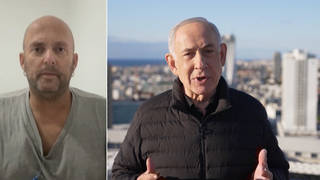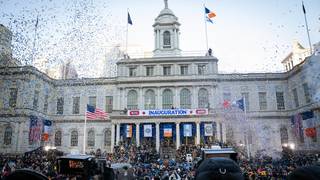
Topics
By Amy Goodman & Denis Moynihan
Zohran Mamdani made history, winning the race to be the next mayor of New York City. The Democratic socialist is the first Muslim and the first person of South Asian descent elected to lead the largest city in the United States. At 34 years old, he is the youngest elected to the office in over a century. His meteoric rise from a little-known state assemblymember to his stunning upset on Tuesday has sent shockwaves through the Democratic Party. With over 100,000 volunteers, a savvy social media presence, and a platform to make New York affordable, Zohran Mamdani charted a path to victory, defeating the state’s disgraced former governor, Andrew Cuomo.
At his victory party at the Brooklyn Paramount late Tuesday night, Mamdani was welcomed on stage by a cheering crowd of jubilant supporters.
He opened his rousing speech saying, “The sun may have set over our city this evening, but, as Eugene Debs once said, I can see the dawn of a better day for humanity,” quoting one of the most famous socialists in US history.
Eugene V. Debs was born to immigrant parents on November 5th, 1855. He started working at 14, laboring on the railroads, becoming a fireman, shoveling coal on steam-powered locomotives. He joined the fireman’s union, rising in its ranks. He then formed the American Railway Union (ARU), to organize all railway industry workers, including, he hoped, women and African Americans.
The ARU struck against the Pullman Company, owned by George Pullman, who built and operated a massive fleet of luxury railroad sleeper cars, amassing a fortune while keeping his workers in near-indentured status in his company town of Pullman, Illinois. The strike went national, hobbling the rail industry. President William Howard Taft called in the military, violently breaking the strike, killing over 30 strikers. As the public face of the strike, Eugene V. Debs was targeted for prosecution. He was convicted and sentenced to six months in a county jail. As he read and wrote in his cell, Debs became more radicalized, and left jail a committed socialist.
By 1900, he ran as the Socialist party’s candidate for president, the first of five such runs. In 1905 he co-founded the IWW, the Industrial Workers of the World, seeking to organize workers across industries into “One Big Union.” During his presidential run in 1912, he built so much momentum that establishment candidates like Woodrow Wilson and Theodore Roosevelt were seriously concerned he could win.
After the US entered World War I, patriotic fervor swept the nation. Congress passed the Espionage Act in 1917, then the Sedition Act in 1918, making it a crime to speak out against the war. Despite this, Debs spoke at an outdoor mass meeting in Canton, Ohio, criticizing the war. No known recordings of Debs’ voice exist, but actor Tim Robbins read the speech in a 2009 performance of Voices of the People’s History of the United States, produced by Anthony Arnove and the late historian Howard Zinn. Debs said, accusing Wall Street tycoons of warmaking,
“Every solitary one of these aristocratic conspirators and would-be murderers claims to be an arch patriot. Every one of them insists that the war is being waged to make the world safe for democracy. What humbug. What rot. What false pretense. Wars throughout history have been waged for conquest and plunder.”
Debs was arrested, tried, convicted, and sentenced to ten years in prison. His address to the court at sentencing, on Sep. 18, 1918, is considered one of the most eloquent speeches in modern English. That’s the speech Mamdani quoted. Debs opened with perhaps his most famous words (performed at a different Voices event by actor David Strathairn),
“While there is a lower class, I am in it, and while there is a criminal element, I am of it, and while there is a soul in prison, I am not free.”
Debs served three years in federal prison – running his final presidential campaign, in 1920, from his cell.
New York City Mayor-Elect Zohran Mamdani chooses his words carefully. In quoting Eugene Debs, he not only signaled his Democratic socialist beliefs; he was issuing a call to action. Like Debs, Mamdani understands, and his campaign embodied, that the struggle for justice requires mass organizing.
President Donald Trump has threatened to punish New York City for electing Mamdani, by cutting off federal funds. Like President Taft, Trump has deployed the military to several cities, and promises more. Mamdani replied to Trump in his speech with a challenge:
“To get to any of us, you will have to get through all of us.” He went on, “New York will remain a city of immigrants: a city built by immigrants, powered by immigrants and, as of tonight, led by an immigrant.”










Media Options